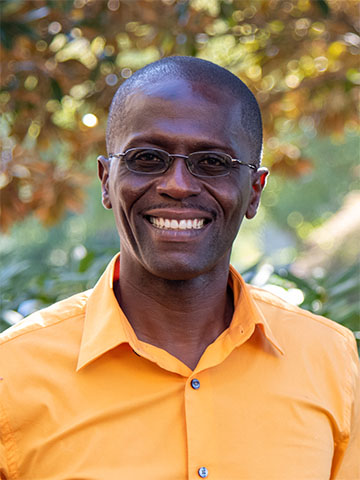Faculty Spotlight: Salmon Shomade

Salmon Shomade's varied and accomplished careers led him to Oxford College, where he has found a home as a professor and mentor.
Salmon Shomade has walked many paths. He has five degrees and has worked in almost as many fields. He's been a civil engineer, a financial analyst, a lawyer licensed in three states and D.C., and—eventually, where he has happily settled—an associate professor of political science at Oxford College, where he is now chair of the division of history and social sciences.
In this role, Shomade uses his wealth of experience and perspective to engage with students from different backgrounds and interests. He is an active mentor who makes space for students to participate in his research and to help them with their own.

Originally from Lagos, Nigeria, Shomade wanted to follow in the footsteps of his uncle, a civil engineer. He came to the States in 1983 and pursued a dual degree engineering program at Clark College (now Clark Atlanta University) and Georgia Tech with a major in civil engineering. After working with the Department of Transportation in Connecticut, he realized he wanted to go back to school. He earned his MBA from the University of Virginia's Darden School, and shortly thereafter, returned to the University of Virginia School of Law for his J.D.
But while practicing law, he longed to return to a university setting, this time with the idea of staying in academia as a teacher. He saw how his wife, Beretta E. Smith-Shomade—now an associate professor at Emory in film and television—was enriched by her own career, and realized that is what he'd been after all along.
"I was feeling, 'This is nice, but I'm not changing anybody's life,'" Shomade said of his time in corporate law. "With all these degrees, one would think I'd want to go teach in law school, but I said, 'No, I'm interested in teaching undergrads.'"
At the intersection of all Shomade's previous work was political science. He had interacted directly with many American institutions and public programs in his career, but he also had been avidly following the world's ever-changing political landscape—in the US as well as his home continent of Africa.
In 2007, he earned his PhD from the University of Arizona in political science, and in 2018 he found his way to Oxford—which he has described as the ideal place for someone interested in helping with the academic and personal development of undergraduate students.
"After so many years, after five degrees, I found my profession. I have found my ideal place," Shomade said. "At Oxford, we are attracting students who are capable—very, very smart and very engaging—and they come in with a sense of 'What can I do to keep developing my knowledge?'"
That thirst for knowledge led Shomade to believe that undergraduate students could work beyond the classroom in roles traditionally reserved for graduate students. Such research positions count for class credit or are paid assistantships. While he involves students in his projects, he also invests in their own research interests.
Sana Punjani, a rising sophomore, began working with Shomade through the Summer Undergraduate Research Experience program (SURE) after some friends recommended him as both an excellent mentor and a fit for her sociological and political research interests. She described the collaboration with Shomade as an experience that would have an "everlasting" impact.
"He took time to help me navigate the unfamiliar terrain [of research] and develop an arsenal of tools that I hope to carry with me throughout my years in academia," Punjani said. "He understood my limits and worked within them to help me become a better student, scholar, and member of the Oxford community."
In developing research competency, he said: "I found that you can take on [these interested students], train them for a few weeks, guide them in what they need to be doing, and then see how they do. As a collective unit, my colleagues and I do a good job of preparing our students so that by the time they get to their second year, they are capable of doing work that would typically be done by seniors or grad students. And I've been fortunate to tap into that."
These experiences, Shomade says, gives many Oxford students an early look at what's required of a career in academia. But more broadly, it gives them a leg up in whatever path they choose to follow—whether that's straight into the workforce, graduate school, or anywhere else. Research—gathering information, experimenting, and making informed decisions—is a translatable skill.
Shomade's presence in the classroom also has impressed colleagues, including Don Beaduette, Oxford assistant professor of political science.
"[Salmon] brings an impressive breadth and depth of knowledge about the law and politics in the United States and numerous African countries into the classroom," Beaudette said. "As a teacher, he challenges his students to ask (and answer) meaningful questions about the political world around them. As a mentor, he has provided many students with advanced research opportunities, letting them put the skills and knowledge they have gained in the classroom to use."
In his new role as division chair, Shomade plans to focus on the active learning that is at the heart of his own teaching style, which he describes as "collaborative" and "interactive." He uses what he calls a "modified Socratic method," where students lead the conversation. He tries to foster as much back and forth between students as possible, while he keeps the conversation on the right track.
Going forward, Shomade is also ready to participate in what he calls the "service aspect" of Oxford—helping to make big picture decisions on curriculum and culture—while maintaining excellence in his research and teaching. Earlier this year, he published his latest book, Colonial Legacies and the Rule of Law in Africa: Ghana, Kenya, Nigeria, South Africa, and Zimbabwe.
As always, he is wearing many hats, and wearing them well.